|
|
|
Sort Order |
|
|
|
Items / Page
|
|
|
|
|
|
|
| Srl | Item |
| 1 |
ID:
144240
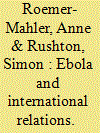

|
|
|
|
|
| Summary/Abstract |
The outbreak of Ebola Virus Disease (EVD) that gripped Liberia, Guinea and Sierra Leone through much of 2014 and 2015 was an enormous and in many ways unprecedented health emergency. Yet the outbreak was not only a global health event – it was also a global political event. In this introduction to the special issue we discuss the contribution that International Relations scholarship can make to analysing and understanding the Ebola outbreak and the global response to it. We group our comments around four key themes: (1) allocating responsibility in a diffuse global health governance system; (2) the causes and effects of Ebola being perceived as a global crisis; (3) the downsides of a security-driven approach to global health emergencies; and (4) issues of inequality both between and within countries, including those around gender, resources and power.
|
|
|
|
|
|
|
|
|
|
|
|
|
|
|
|
| 2 |
ID:
157970
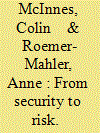

|
|
|
|
|
| Summary/Abstract |
The rise of health issues such as HIV, pandemic influenza and Ebola on international agendas has led to the framing of threats to health as security issues. This has created an uneasy relationship between politics and health, by moving national interests into an area traditionally dominated by scientific rationalities and a predisposition towards cosmopolitan norms. Framing global health threats as risks, however, appears to be less politically charged and divisive, combining an aura of scientific objectivity with a moral call to action. In this article we argue that, despite its technical use in public health, in the policy discourse on global health the risk frame is not immune to values and interests but inherently political. It privileges a specific approach to global health policy which focuses on potential future catastrophes rather than presently existing health problems, emphasizes technological solutions rather than addressing the socio-economic determinants of health, while there is no single risk frame, but rather multiple risk frames existing simultaneously, as seen during the 2014–15 west African Ebola outbreak. However, framing health in terms of risk is useful in understanding how health issues reflect and contribute to the wider Zeitgeist concerning societal vulnerability: that dangers exist which are uncontrollable and are the product of technical progress. The risk frame allows us to place health issues into this wider context, where disease is just one of a number of concurrent dangers, rather than a separately identifiable hazard.
|
|
|
|
|
|
|
|
|
|
|
|
|
|
|
|
| 3 |
ID:
144247
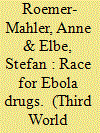

|
|
|
|
|
| Summary/Abstract |
The international Ebola response mirrors two broader trends in global health governance: (1) the framing of infectious disease outbreaks as a security threat; and (2) a tendency to respond by providing medicines and vaccines. This article identifies three mechanisms that interlink these trends. First, securitisation encourages technological policy responses. Second, it creates an exceptional political space in which pharmaceutical development can be freed from constraints. Third, it creates an institutional architecture that facilitates pharmaceutical policy responses. The ways in which the securitisation of health reinforces pharmaceutical policy strategies must, the article concludes, be included in ongoing efforts to evaluate them normatively and politically.
|
|
|
|
|
|
|
|
|
|
|
|
|
|
|
|
| 4 |
ID:
141062
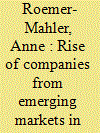

|
|
|
|
|
| Summary/Abstract |
The article analyses the involvement of pharmaceutical companies from emerging markets in global health governance. It finds that they play a central role as low-cost suppliers of medicines and vaccines and, increasingly, new technologies. In so doing, pharmaceutical companies from emerging markets have facilitated the implementation of a key goal of global health policy: widening access to pharmaceutical treatment and prevention. Yet, looking closer at the political economy underlying their involvement, the article exposes a tension between this policy goal and the political economy of pharmaceutical development and production. By declaring access to pharmaceuticals a goal of global health policy, governments and global health partnerships have made themselves dependent on pharmaceutical companies to supply them. Moreover, to provide pharmaceutical treatment and prevention at the global level, they depend on companies to supply medicines and vaccines at extremely low prices. Yet, the development and production of pharmaceuticals is organised around commercial incentives that are at odds with the prices required. The increasing involvement of low-cost suppliers from emerging markets mitigates this tension in the short run. In the long run, this tension endangers the sustainability of global access policies and may even undermine some of the successes already achieved.
|
|
|
|
|
|
|
|
|
|
|
|
|
|
|
|
| 5 |
ID:
134474
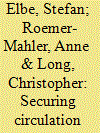

|
|
|
|
|
| Summary/Abstract |
Governments in Europe and around the world amassed vast pharmaceutical stockpiles in anticipation of a potentially catastrophic influenza pandemic. Yet the comparatively ‘mild’ course of the 2009 H1N1 pandemic provoked considerable public controversy around those stockpiles, leading to questions about their cost–benefit profile and the commercial interests allegedly shaping their creation, as well as around their scientific evidence base. So, how did governments come to view pharmaceutical stockpiling as such an indispensable element of pandemic preparedness planning? What are the underlying security rationalities that rapidly rendered antivirals such a desirable option for government planners? Drawing upon an in-depth reading of Foucault’s notion of a ‘crisis of circulation’, this article argues that the rise of pharmaceutical stockpiling across Europe is integral to a governmental rationality of political rule that continuously seeks to anticipate myriad circulatory threats to the welfare of populations – including to their overall levels of health. Novel antiviral medications such as Tamiflu are such an attractive policy option because they could enable governments to rapidly modulate dangerous levels of (viral) circulation during a pandemic, albeit without disrupting all the other circulatory systems crucial for maintaining population welfare. Antiviral stockpiles, in other words, promise nothing less than a pharmaceutical securing of circulation itself.
|
|
|
|
|
|
|
|
|
|
|
|
|
|
|
|
|
|
|
|
|